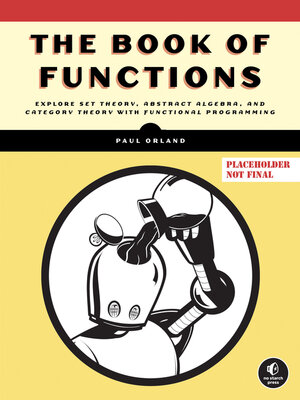The Book of Functions
ebook ∣ Explore Set Theory, Abstract Algebra, and Category Theory with Functional Programming
By Paul Orland

Sign up to save your library
With an OverDrive account, you can save your favorite libraries for at-a-glance information about availability. Find out more about OverDrive accounts.
Find this title in Libby, the library reading app by OverDrive.



Search for a digital library with this title
Title found at these libraries:
| Library Name | Distance |
|---|---|
| Loading... |
This surprisingly accessible book uses key math concepts and more than 500 short exercises to teach functional programming to experienced coders.
Functional programming is a coding paradigm that emphasizes functions, repeatable computations that take input data and produce corresponding outputs. Functions are also important concepts in math, and a lot of deep mathematical insights shed light on functional computer programming.
In this book, the author uses functional programming to introduce mathematical concepts – most notably set theory, abstract algebra, and category theory – and in turn uses that math to describe functional programming design patterns. The more than 500 short programming exercises included in the book will help you master functional programming and math skills alike, with code examples presented in the F# language.
Functional programming is a coding paradigm that emphasizes functions, repeatable computations that take input data and produce corresponding outputs. Functions are also important concepts in math, and a lot of deep mathematical insights shed light on functional computer programming.
In this book, the author uses functional programming to introduce mathematical concepts – most notably set theory, abstract algebra, and category theory – and in turn uses that math to describe functional programming design patterns. The more than 500 short programming exercises included in the book will help you master functional programming and math skills alike, with code examples presented in the F# language.







